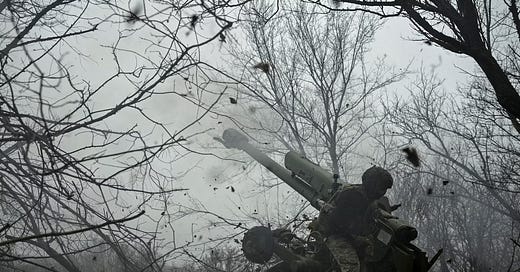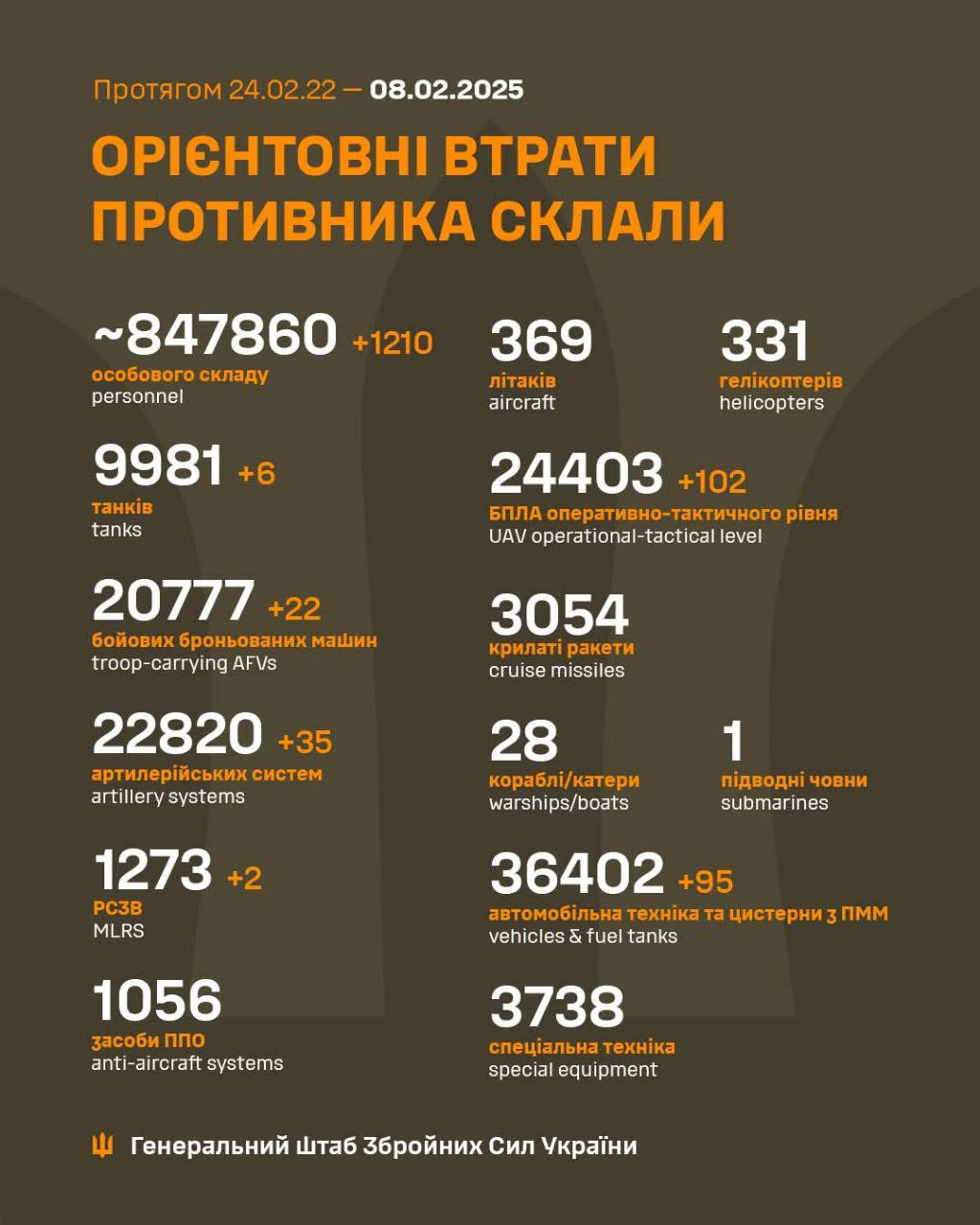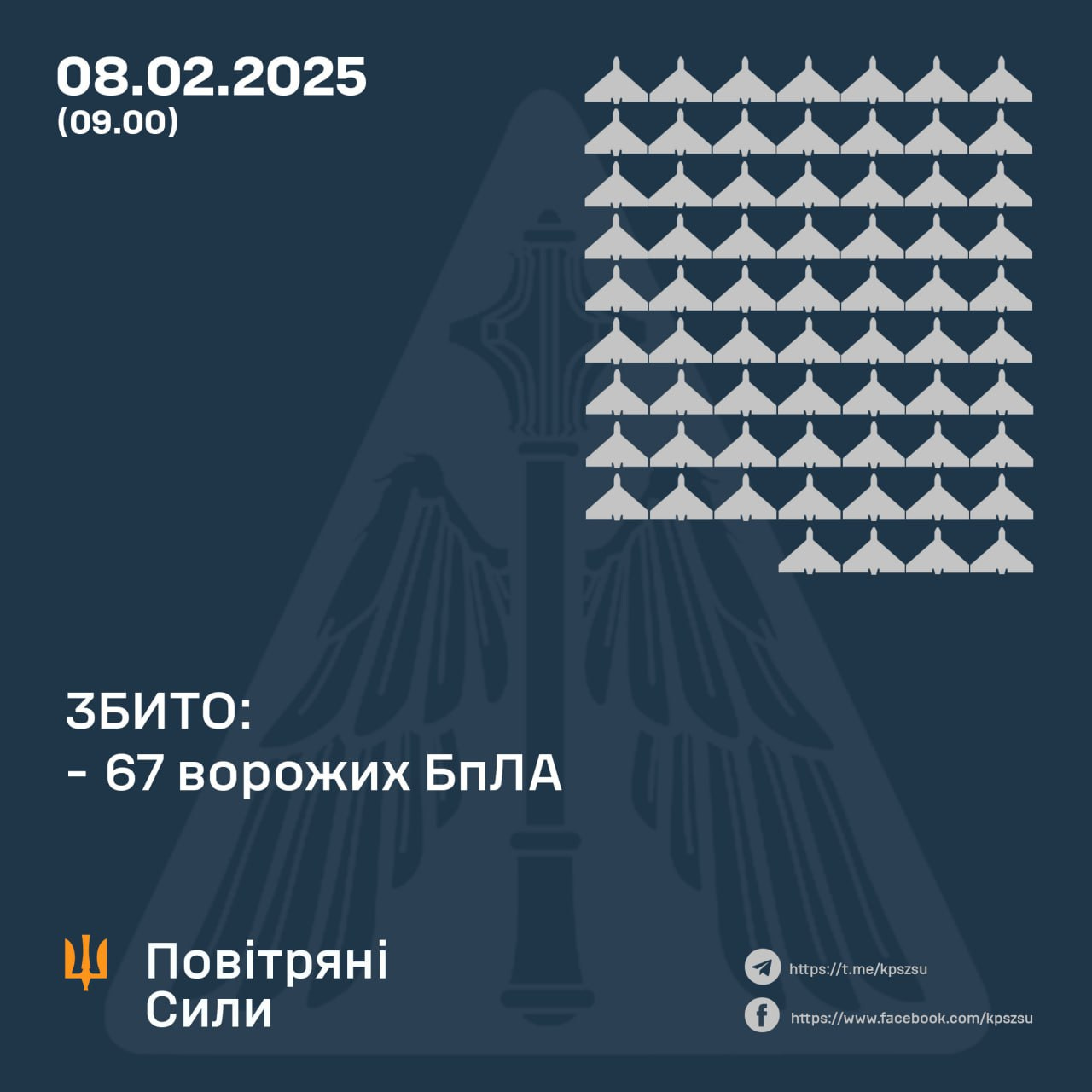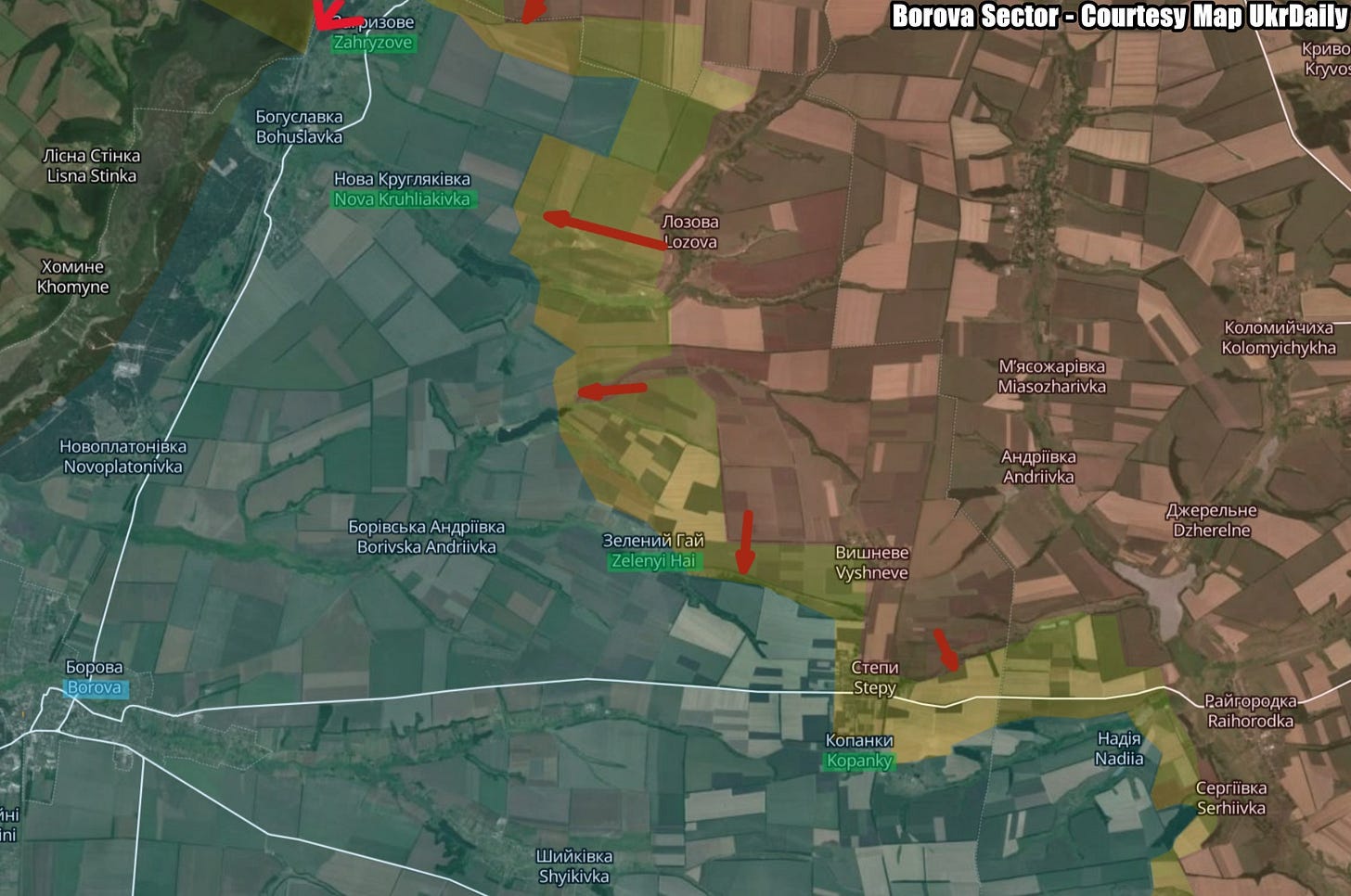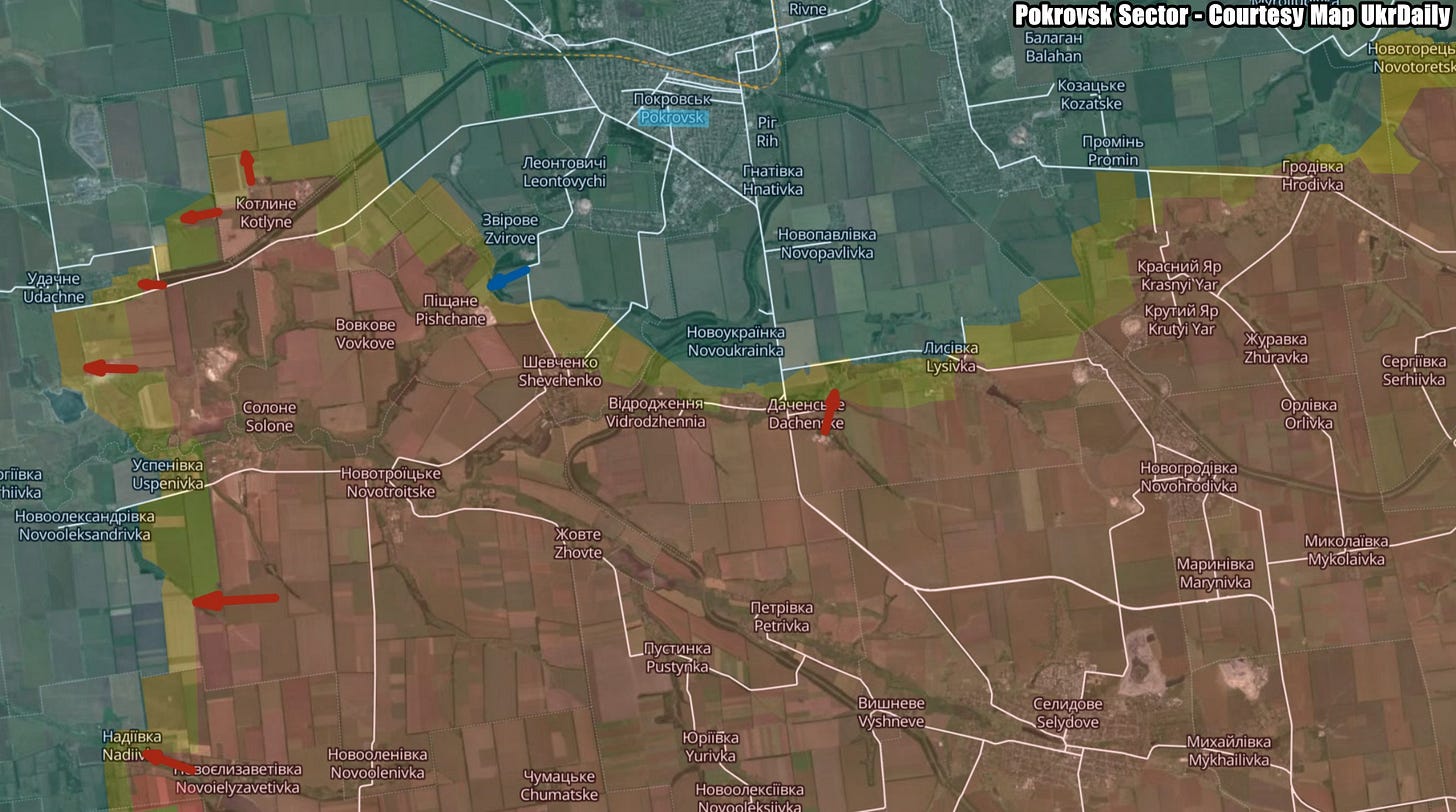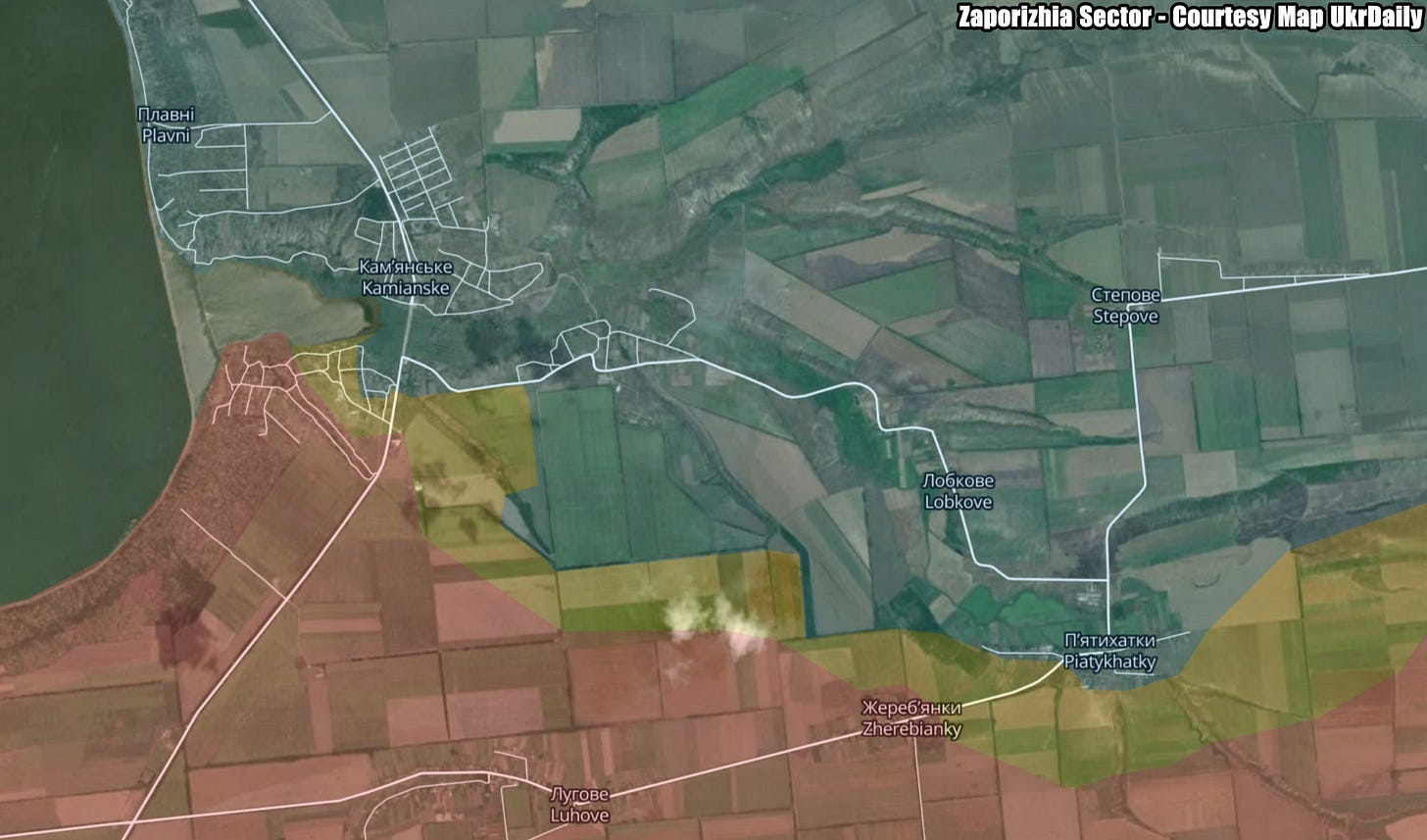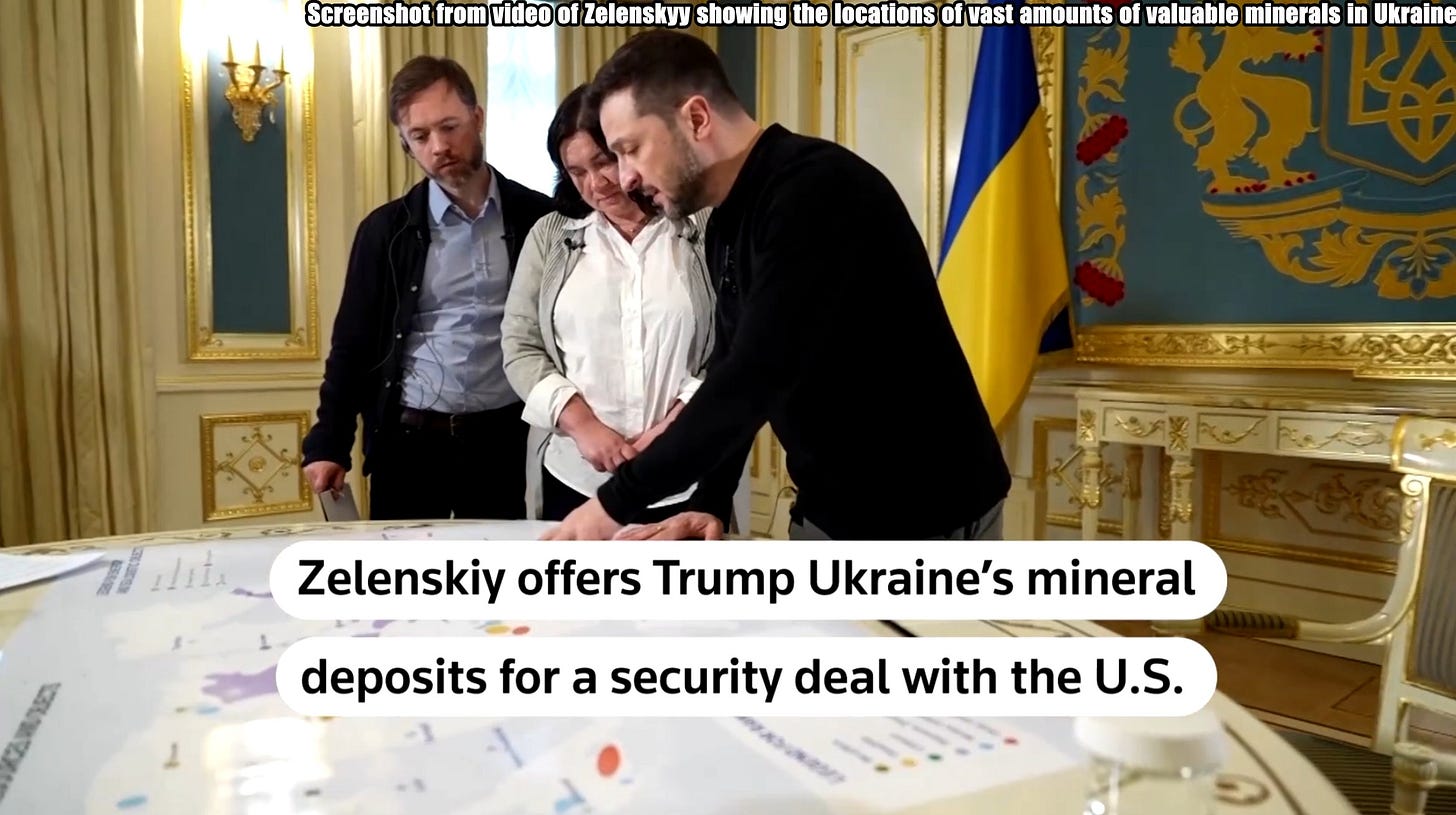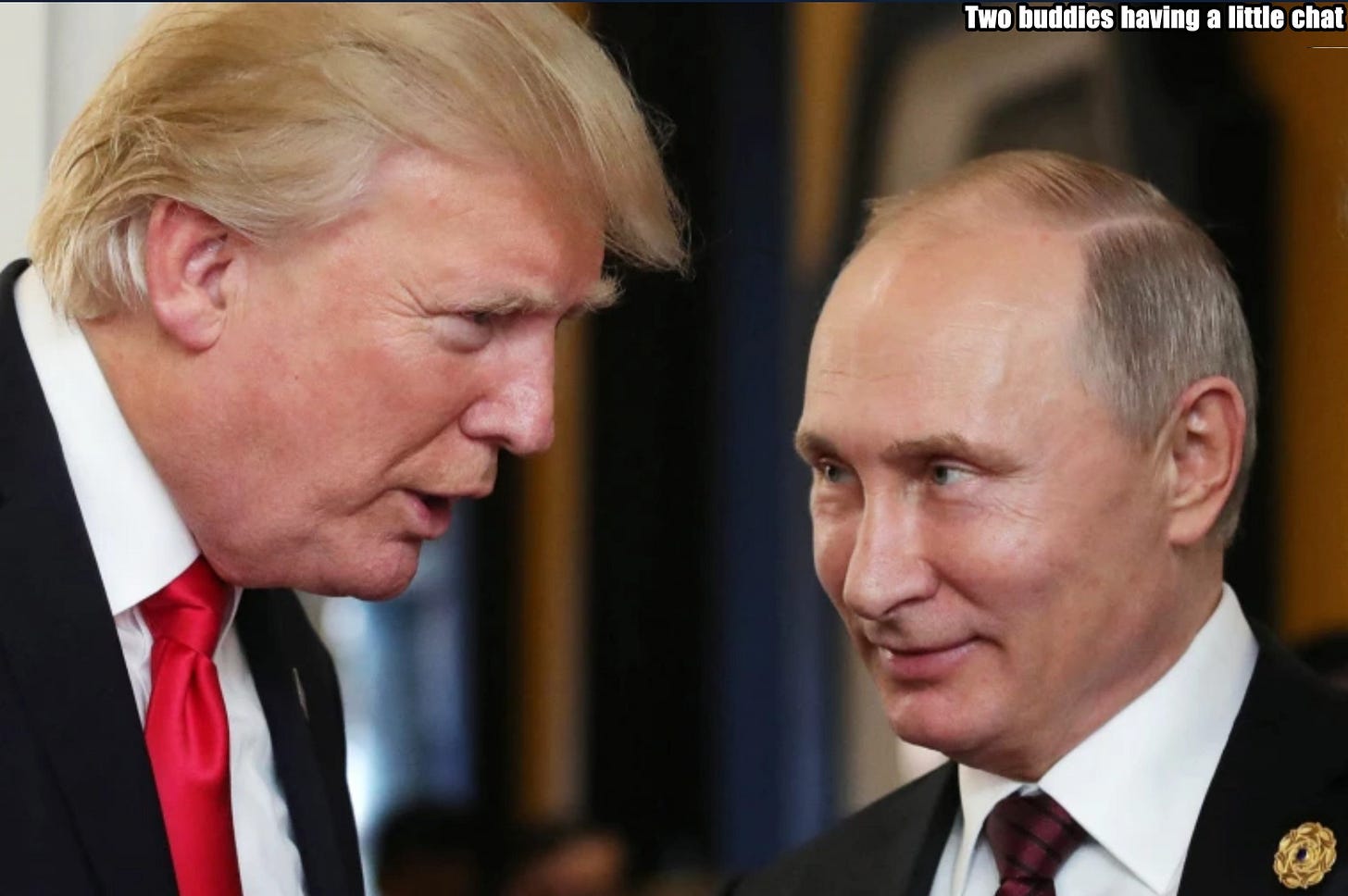Slava Ukraini! In early 2022 I began a Telegram channel aggregating news from a number of sources daily on the war in Ukraine. In June 2023 I began providing a daily draft for the Ukraine War Brief Podcast collecting news from over 70 sources daily, which formed the basis of the script. While the Podcast no longer exists I have continued to make this Brief available for my followers here on Substack for those who wish to keep up with the news from the war.
All the latest news on the Russo-Ukraine War 6 days per week
ALONG THE CONTACT LINE
GSAFU Morning Report
The General Staff of the Armed Forces of Ukraine in its Operational Information update at 08:00 on Feb 8 stated that day 1081 of the full-scale invasion of the Russian Federation against Ukraine had begun.
The situation on the line of combat remains tense in some sectors. Ukrainian defenders continue to actively counteract the Russian aggressor, causing them significant losses in personnel, equipment and technology. Exhausting the enemy along the entire front line and continuing to disrupt the plans of Russian occupiers to advance deeper into the territory of Ukraine.
During the past day, 123 combat engagements took place.
Over the past 24 hours, the enemy carried out 106 air strikes, used 2,170 drones and fired approximately 5,300 artillery shells across the positions of Ukrainian forces and civilians.
Air Force Daily Report
67 ENEMY UAVS SHOT DOWN, 71 DROPPED UNPLUGS DID NOT REACH THEIR TARGETS (LOCATIONALLY LOST)
➖➖➖➖➖➖➖➖➖
On the night of February 8, 2025 (from 7:30 p.m. on February 7), the enemy attacked with 139 Shahed attack UAVs and simulator drones of various types from the directions: Kursk, Orel, Millerovo, Bryansk, Shatalovo — Russia.
The air attack was repelled by aviation, anti-aircraft missile troops, electronic warfare units, and mobile fire groups of the Air Force and Defense Forces of Ukraine.
As of 09:00, it was confirmed that 67 Shahed attack UAVs and drones of other types were shot down in Kyiv, Kharkiv, Poltava, Sumy, Cherkasy, Chernihiv, Kirovohrad, Vinnytsia, Zhytomyr, Khmelnytskyi, Zaporizhia, Dnipropetrovsk, Donetsk and Odessa regions.
71 enemy drone simulators — lost in location (without negative consequences).
As a result of the enemy attack, the Sumy, Poltava, Dnipropetrovsk, and Kyiv regions suffered
Combat Operations in the Kursk Sector, Russian Federation
The Institute for the Study of War (ISW), a US based think tank, in its Feb 7 Russian Offensive Campaign Assessment reported that Ukrainian forces marginally advanced during mechanized assaults in their salient in Kursk Oblast on Feb 6, but Russian sources claimed on Feb 6 and 7 that Russian forces have at least temporarily stalled Ukrainian advances southeast of Sudzha.
Geolocated footage published on Feb 6 indicates that Ukrainian forces marginally advanced along the 38K-028 Sudzha-Oboyan highway and in the fields east of Fanaseyevka (southeast of Sudzha) during the Feb 6 attacks. Russian sources widely claimed that Russian forces repelled all Ukrainian attacks on Feb 6 and on the night of Feb 6 to 7 but acknowledged that Ukrainian forces maintain some positions near Cherkasskaya Konopelka (north of Fanaseyevka), Fanaseyevka, and Ulanok (east of Fanaseyevka).
A Kremlin-affiliated Russian milblogger claimed that fighting is ongoing on the outskirts of Makhnovka (just southeast of Sudzha) but that Ukrainian forces did not launch new attacks near Cherkasskaya Konopelka during the day on February 7. Russian milbloggers continued to issue conflicting claims about the situation in Cherkasskaya Konopelka. Some milbloggers claimed that Ukrainian forces have seized the settlement, while others claimed that Ukrainian forces bypassed the settlement or that Russian forces have retaken the settlement. ISW cannot independently verify Russian claims about the situation in Cherkasskaya Konopelka.
Russian sources provided additional information about the Russian force grouping defending southeast of Sudzha. The Russian Ministry of Defense (MoD) reported that elements of the Russian 11th Airborne (VDV) Brigade, 810th Naval Infantry Brigade (Black Sea Fleet), 40th Naval Infantry Brigade (Pacific Fleet), 177th Naval Infantry Regiment (Caspian Flotilla), "Veterany" Assault Brigade (Russian Volunteer Corps), "Arbat" Special Purpose Battalion (51st Combined Arms Army [CAA], formerly 1st Donetsk People's Republic Army Corps [DNR AC], SMD), and drone operators of the Russian Rubicon Center for Advanced Unmanned Technologies are defending in the area. Russian milbloggers widely credited drone operators of the Chechen Akhmat Spetsnaz forces with defending against the Ukrainian attacks on Feb 6 and 7 and complained that the Russian MoD did not acknowledge the Chechen drone operators. Russian milbloggers also claimed that the Russian military command reportedly removed the 11th VDV Brigade's commander and that the MoD is blaming the commander for failing to sufficiently man and defend Russian positions near Cherkasskaya Konopelka.
The Khortytsia operational-strategic group
(Responsible for the northeastern part of Ukraine. )
Borova Sector: Russian forces recently advanced in the Borova direction amid continued offensive operations in the area on Feb 7. Russian forces attacked northeast of Borova near Zahryzove, Nova Kruhlyakivka, Zeleny Hai, and Lozova; west of Borova near Kopanky; and southeast of Borova near Novoyehorivka, Novoserhiivka, and Hrekivka on Feb 6 and 7.
Geolocated footage published on Feb 7 indicates that Russian forces recently advanced northwest of Zahryzove (northeast of Borova).
Toretsk Sector: Russian forces recently advanced in northern Toretsk amid claims that Russian forces seized Toretsk as of Feb 7. Russian forces attacked in Toretsk itself and north of Toretsk near Dyliivka on Feb 6 and 7.
Geolocated footage published on Feb 6 indicates that Russian forces recently advanced along Puzanova Street in northern Toretsk.
The Tavria operational-strategic group
(Responsible for the central-eastern and southeastern part of Ukraine.)
Pokrovsk Sector : Russian forces continued offensive operations in the Pokrovsk direction on Feb 7 but did not advance. Russian forces conducted offensive operations near Pokrovsk itself; east of Pokrovsk near Zelene Pole, Tarasivka, Myrolyubivka, Promin, Vodyane Druhe, Yelyzavetivka, and Novotoretske; southeast of Pokrovsk near Lysivka; and southwest of Pokrovsk near Zvirove, Pishchane, Novooleksandriivka, Nadiivka, Kotlyarivka, Udachne, Novoserhiivka, and Uspenivka on Feb 6 and 7.
Zaporizhia Sector: Positional fighting continued in western Zaporizhia Oblast on Feb 7, but Russian forces did not advance. Geolocated footage published on Feb 5 shows Russian forces repelling a platoon-sized Ukrainian mechanized assault near Kamyanske (northwest of Robotyne).
The Odesa operational-strategic group
(Responsible for Kherson, Qırım, (also known as Crimea) and the Black Sea.)
There have been no major changes to the combat environment since our last report.
TEMPORARILY OCCUPIED TERRITORIES
HIMARS strike reportedly wipes out Russian command centre in Selydove.
Ukraine’s Defense Forces struck a Russian headquarters in the occupied city of Selydove, Donetsk Oblast, New Voice reports citing journalist Denys Kazanskyi on Feb. 8. “Rumors suggest that the entire command staff was killed,” Kazanskyi wrote.
The attack was carried out using HIMARS rockets, targeting the headquarters of Russia’s 35th Brigade.
A video allegedly showing the strike on the Russian command post has surfaced online. Among those who shared the footage was Andrii Kovalenko, head of Ukraine’s National Security and Defense Council’s Center for Countering Disinformation. The drone-captured footage shows a massive explosion, thick smoke, and a crater at the strike site.
The city of Selydove in Donetsk Oblast has been under Russian occupation since October 2024. Russian forces had attempted to capture the settlement for several months before taking control.
THE HOME FRONT
Zelenskyy says 'Let's do a deal', offering Trump mineral partnership, for security guarantees.
Ukrainian President Volodymyr Zelenskiy pored over a once-classified map of vast deposits of rare earths and other critical minerals during an interview with Reuters on Friday, part of a push to appeal to Donald Trump's penchant for a deal. Reuters reports.
The U.S. president, whose administration is pressing for a rapid end to Ukraine's war with Russia, said on Monday he wanted Ukraine to supply the U.S. with rare earths and other minerals in return for financially supporting its war effort.
"If we are talking about a deal, then let's do a deal, we are only for it," Zelenskyy said, emphasising Ukraine's need for security guarantees from its allies as part of any settlement.
Ukraine floated the idea of opening its critical minerals to investment by allies last autumn, as it presented a "victory plan" that sought to put it in the strongest position for talks and force Moscow to the table.
Zelenskyy said less than 20% of Ukraine's mineral resources, including about half its rare earth deposits, were under Russian occupation.
Rare earths are important in the manufacture of high-performance magnets, electric motors and consumer electronics; Zelenskyy said Moscow could open those resources to its allies North Korea and Iran, both sworn U.S. enemies.
"We need to stop Putin and protect what we have - a very rich Dnipro region, central Ukraine," he said.
Russian troops have been gaining ground in the east for months, throwing huge resources into an unrelenting offensive while Kyiv's much smaller army grapples with a shortage of soldiers and frets over future weapons supplies from abroad.
Zelenskyy said Ukraine had Europe's largest reserves of titanium, essential for the aviation and space industry, and uranium, used for nuclear energy and weapons.
Many of the titanium deposits were marked in northwestern Ukraine, far from the fighting.
Ukraine has rapidly retuned its foreign policy approach to align with the transactional world view set out by the new occupant of the White House, Ukraine's most important ally.
But Zelenskyy emphasised that Kyiv was not proposing "giving away" its resources, but offering a mutually beneficial partnership to develop them jointly:
"The Americans helped the most, and therefore the Americans should earn the most. And they should have this priority, and they will. I would also like to talk about this with President Trump."
He said Russia knew in detail where Ukraine's critical resources were from Soviet-era geological surveys that had been taken back to Moscow when Kyiv gained independence in 1991.
In addition, Zelenskyy said Kyiv and the White House were discussing the idea of using Ukraine's vast underground gas storage sites to store U.S. liquefied natural gas.
"I know that the Trump administration is very interested in it ... We're ready and willing to have contracts for LNG supplies to Ukraine. And of course, we will be a hub for the whole of Europe," he said.
The interview comes days before the February 14-16 Munich Security Conference, where officials from dozens of Western countries will converge at an unpredictable juncture in the nearly three-year-old war.
Zelenskyy said he planned to attend the forum, where Keith Kellogg, Trump's special envoy for Russia and Ukraine, is also expected.
The Ukrainian leader said it was essential that he met Trump in person before the U.S. president meets Russian President Vladimir Putin, "otherwise it will look like a dialogue about Ukraine without Ukraine".
Trump said on Friday that he expected to talk to Zelenskiy next week. Zelenskiy said his own priority would be raising Ukraine's need for security guarantees as part of any deal, to prevent Russia launching another invasion in the future.
Russian airstrike in Sumy region kills three.
A Russian airstrike on a two-story residential building in the village of Myropillia, Sumy region, has killed three civilians. The Sumy Regional Prosecutor's Office reported this on Telegram.
According to the prosecutor's office, on Thursday, February 6, at approximately 23:20, Russian forces dropped three guided aerial bombs on a two-story apartment building in Myropillia, Sumy district, using methods of warfare prohibited by international law.
"The enemy attack killed three people. The bodies of two men, aged 42 and 57, were recovered from the rubble, while the third victim is being identified," the post reads.
RUSSIAN WORLD
Kremlin Gloats as Trump Sanctions International Criminal Court.
Nearly two years after the ICC put out a warrant for Putin's arrest on war crimes charges, Russia's elites feel the West's attempts to isolate them slipping. The Moscow Times reports.
Russian officials are celebrating U.S. President Donald Trump’s move to sanction the International Criminal Court (ICC) as a game-changer that will weaken the court’s global influence and hamper the West’s efforts to isolate President Vladimir Putin and his inner circle.
Announced after hosting Israeli Prime Minister Benjamin Netanyahu — himself wanted by the ICC — in Washington, Trump’s sanctions on The Hague-based court could impose financial and visa restrictions on anyone aiding ICC probes against American citizens or allies.
The decision was received with satisfaction and even gloating among top Russian officials, The Moscow Times has learned, with Moscow seeing it as a direct blow to the efforts by Ukraine’s allies to turn Putin into an international pariah.
The Kremlin was reserved in its public response to Trump’s move, with Putin’s spokesman Dmitry Peskov saying: “Russia does not recognize the ICC. U.S. sanctions against them are none of our business.”
“I’m delighted. This is great news. The ICC had gotten too arrogant, and now Washington has put them in their place,” one high-ranking Kremlin official told The Moscow Times on condition of anonymity. One Russian diplomat was even more blunt, calling Trump’s move "a gift to Moscow."
“This won’t change the situation overnight, but it gives the President, his team and his security services more maneuverability when planning travel. We won’t have a repeat of the BRICS summit fiasco in South Africa,” the diplomat told The Moscow Times.
In September 2024, Putin tested the limits of the ICC warrant’s power by visiting Mongolia, marking his first — and so far only — trip to a country recognizing the court’s jurisdiction.
With Trump’s sanctions in place, the Kremlin is hoping even more doors will soon reopen.
INTERNATIONAL NEWS
Baltic States finally disconnect from Russian power grid.
Lithuania, Latvia, and Estonia began the process of disconnecting their power systems from the joint grid with Russia and Belarus (BRELL) on the morning of Feb. 8, AFP reported.
Although Lithuania, Latvia, and Estonia have not purchased electricity from Russia and Belarus for years, they were still part of Russia’s IPS/UPS system, where frequency regulation was centralized in Moscow.
According to a representative of Lithuania’s grid operator Litgrid, Lithuania was the first of the three Baltic states to start the disconnection process at around 6 a.m. Kyiv time, with Latvia and Estonia following a few hours later.
Litgrid CEO Rokas Masiulis told LRT that the process went according to plan, even slightly ahead of schedule, in coordination with Russian authorities.
The disconnection was carried out in stages: the first transmission line to Russia was switched off, followed by a second 10-15 minutes later, and a third after another similar interval. About half an hour later, the Belarusian line was disconnected, and by 7:43 a.m., Lithuania had fully cut its lines to both Kaliningrad and Belarus.
Following the disconnection, an isolated operation test will be conducted, lasting until Sunday. During this test, operators from the three Baltic states—Litgrid, Latvia’s AST, and Estonia’s Elering—will independently manage system frequency and assess resilience to potential disruptions.
During the isolated operation, electricity will be generated by local power plants.
After the test concludes on Sunday afternoon, the Baltic states will connect to Poland and the wider synchronous zone of continental Europe via the LitPol Link interconnector. The physical dismantling of power lines to Russia and Belarus will begin later.
Baltic grid operators first applied for connection to Europe’s continental power network in 2007.
Trump's pick for FBI chief took money from Russian propagandist
Kash Patel, U.S. President Donald Trump's nominee to lead the Federal Bureau of Investigation (FBI), received $25,000 in 2024 from a film company run by pro-Kremlin filmmaker Igor Lopatonok, the Kyiv Independent reported citing an article in the Washington Post on Feb. 7.
A number of Trump's nominees and allies have faced scrutiny for their apparent support of Russia amid the full-scale war against Ukraine.
Patel received the $25,000 payment from Global Tree Pictures, Lopatonok's Los Angeles-based company, according to financial disclosures submitted as part of his nomination process and seen by the WP.
The payment came after Patel participated in a documentary about Trump that aired on TCN, the online network of right-wing commentator Tucker Carlson.
Lopatonok holds U.S-Russian dual citizenship and has produced numerous projects advancing pro-Kremlin narratives. Though born in Ukraine, Lopatonok has made films criticizing the EuroMaidan Revolution and appeared on a red carpet alongside pro-Russian oligarch Viktor Medvedchuk.
Medvedchuk, a close friend of Russian President Vladimir Putin, was detained by Ukrainian authorities on charges of treason in 2022 and later exchanged in a prisoner swap with Russia.
Lopatonok has also claimed Russian state media directors and Belarusian dictator Alexander Lukashenko as his supporters, the WP reports.
In 2023, Lopatonok helmed a project titled "To Russia With Love" that aimed to circulate pro-Russian videos online. The influence campaign reportedly received $31,000 in funds from a foundation established by Putin.
Patel partnered with Lopatonok on a documentary series called "All the President's Men," which portrayed Patel and other figures from Trump's first term as victims of a conspiracy aimed at undermining the president.
The series was broadcast on the online network of Tucker Carlson, who also frequently spouts Kremlin propaganda narratives and infamously interviewed Putin in Moscow last year.
In the documentary, Patel says that Russia is not among the "true enemies" of the U.S. He also promises to "shut down the FBI headquarters building and open it up as a museum to the deep state."
Patel is a Trump loyalist who, if confirmed as FBI director, would hold one of the top positions in the administration. In an interview with the Kyiv Independent in November 2024, U.S. national security expert Evelyn Farkas described Patel as one of Trump's "yes men."
"Kash Patel, for example, is a guy who also seems to have no principles, only wants power and has a sense of grievance like Trump, so he's willing to do whatever it takes to make Trump happy," she said.
MILITARY & TECH
Nothing major to report.
That’s it for today’s Brief folks if you would like to keep up with events in Ukraine daily please consider subscribing, it’s free!


